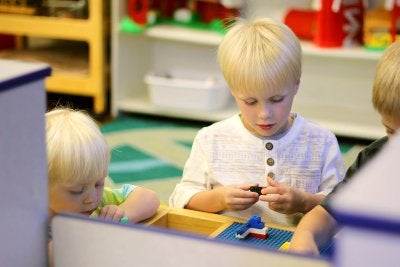-
Helping Your Young Student with Reading
A child’s reading skills are one of the most influential predictors of future success. It’s never too soon to begin instilling early literacy skills in your young learner. In fact, simply talking to an infant often throughout the day will help him or her absorb the sounds and rhythms of language. As your young student enters first grade in Pembroke Pines, he or she will begin the transition from picture books to “easy readers.” There are many ways you can support your first grader’s reading skills at home.

Create a Literate Home
First graders learn by example. To encourage your young learner to remain interested in books, it’s essential to be a good role model. Let your child see you reading a wide variety of materials every day, including fiction books, nonfiction books, magazines, and newspapers. Keep reading materials readily available in the home. Even if your child cannot read most titles yet, he or she will benefit from growing up in a literate home .
Build Phonemic Awareness
Phonemic awareness is an essential building block of literacy skills. This ability allows children to identify and use the individual sounds within the words. Better phonemic awareness supports a child’s reading comprehension and spelling abilities. You can support your child’s phonemic awareness by sounding out each individual component of the word when reading together. Even if a word has only one syllable, you can stretch out the sounds so that your child can hear them better. For example, the word “chair” can be broken down into the sounds “ch” and “air.”
Encourage Storytelling
If your child does not express much interest in books, you can engage him or her by encouraging your child’s natural storytelling abilities. Ask your child to tell you a story and write it down while he or she is speaking. Then, read the story aloud while pointing to each word. Do not expect a first grader to compose a long story complete with plot and themes. A simple story might consist of, “I like eggs. My cat is brown,” and so on. After writing down your child’s story, ask him or her to illustrate it to encourage a sense of ownership.
-
The Benefits of Pre-Kindergarten
When your child is about four years old, it’s time to enroll him or her in a pre-kindergarten program in Pembroke Pines . Pre-kindergarten introduces children to structured learning activities within a classroom environment. Not only do they learn essential pre-academic skills, pre-k students also grow in emotional and social maturity. If your child has already been attending preschool, then the transition to pre-kindergarten will be a natural and easy one to make.

Independence
For parents of four-year-olds, it’s often difficult to accept that their little ones are developing their own independent identities. In fact, many parents often have a harder time adjusting to separation than their children do. Spending time in a school environment is an important step in every child’s development. Pre-kindergarten allows children to learn how to make their own choices (within reason) and thrive while away from home for a little while.
Socio-Emotional Maturity
Enrolling your child in a pre-kindergarten program will allow his or her socio-emotional intelligence to grow by leaps and bounds. All children need the life experiences that come from functioning as part of a small community. Through trial and error, and gentle guidance from the teacher, your child will learn how to interact with others in appropriate ways and how to enjoy group work as well as independent work. Your child will develop critical friendship skills like taking turns and sharing, and important classroom skills like how to capture the teacher’s attention appropriately. Being a member of a classroom community enables your child to practice his or her verbal communication skills with peers and adults.
Academic Foundation
Another primary benefit of enrolling your child in a pre-k school is to give him or her a solid foundation for lifelong learning. At this critical stage in a child’s development, he or she truly wants to learn. Your child is curious about the world and how it works, and pre-k nurtures this curiosity to encourage your child to develop a lifelong love of learning. Of course, your child will also learn crucial pre-academic skills that will prepare him or her to excel in kindergarten, first grade, and beyond.
-
Encouraging Self-Help Skills in Your Pre-K Student
At around preschool age, or age two, your child should begin exhibiting signs of independence. You can help your child become more confident in his independence, self-reliance, and ability to self-soothe and help himself by enrolling him in a pre-kindergarten program near Pembroke Pines. Here are some other ways that you can encourage self-help skills in your pre-k student:

Allow him to dress and groom himself.
The first steps that you can take to encourage your child’s independence are to allow him to dress and groom himself. Let him pick out the clothes that he wants to wear to preschool or pre-kindergarten each day. Encourage him to tie his own shoes and button his shirts and pants. Try to build up to the stage where your preschooler can wash his hands on his own by putting a stepstool in the bathroom or kitchen, and providing an easy-to-use soap dispenser. You can also encourage him to brush his own hair and wash his own face.
Suggest that he clean up his own toys.
Prior to preschool or pre-kindergarten age, your child may have relied on you to clean up after him. By the time he begins preschool at an early childhood learning center, he should know how to clean up his own toys. Throughout his early childhood education, your child will be expected to put away the toys and materials he used during classroom activities. Stay firm at home when your child leaves a mess, and resist the urge to give in and clean it up for him. A huge part of helping your child fully develop independence and self-reliance is encouraging him to learn how to complete basic life skills on his own from a young age.
Prompt dialogue about feelings and needs.
Your child will be better at helping himself and self-soothing if he understands his feelings and knows how to talk about his needs. Don’t shy away from creating a dialogue with your preschool-aged child about how he is feeling, and how he can ease feelings of discomfort, anger, frustration, or sadness.
-
Building a Nurturing Education Environment for Toddlers
If you are looking for early childhood education in Pembroke Pines , you may be wondering what to look for in a nurturing toddler learning environment. At this stage of child development, it’s important for toddlers to cultivate warm and positive relationships with adults. Their educational environment should allow them to feel secure and help them to develop a sense of trust.
When choosing a toddler education center, look for places that promise an attentive staff who will be responsive to all of your child’s needs. Their caregivers should provide an environment where talking, playing, and interacting is a primary focus, and that provides a nurturing atmosphere in which your toddler can grow and learn about the world around him.
If you want to find a nurturing education environment for your toddler, look for one with highly-qualified and trained staff members. Ask questions to make sure you choose a loving and caring atmosphere where your toddler will be able to learn and flourish.

RECENT POSTS
categories
- Uncategorized
- Early Learning Center
- Pre-K
- Children
- Child Care Center
- Preschooler
- Preschool Blog Category | Tanglewood Academy
- Preschool Lunch
- Tanglewood Academy
- After-School Program
- Toddler School
- Early Childhood Education
- preschool activities
- pre-kindergarten
- childhood education
- pre-kindergarten programs
- Children’s education
- enrichment opportunities
- Kindergarten
- Nurturing Education Environment
- Toddler Care
- Child Separation Anxiety
- Toddlers
- Summer camp
- summer activities
- VPK
- Voluntary Pre-K
- Outdoor Activities
- Smart Strategies
- Tie Shoes
- Snacks
- Physical Activities
- Education
- Enrichment Activities for Kids
- Early Education Activities
- Preschool Curriculum
- Classroom Learning
- APPLE accreditation
- Language Comprehension
